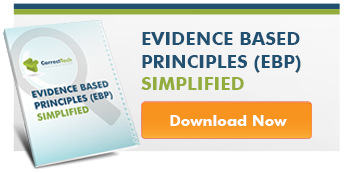What a powerful statement made by Dr. Ed Latessa while speaking about what works and doesn’t work in reducing recidivism at the OCCA conference in May of 2018. Of course, you need referees in a game and metaphorically when running a community corrections program. We must play by and enforce the rules, but coaches win games and make their players successful. Community corrections does need staff that “blow the whistle” when clients go out of bounds, give appropriate consequences and redirection, but that alone only keeps people in bounds during the game, it doesn’t teach them how to improve their skills and improve long term. In my experience, Dr. Latessa is dead on. Staff naturally gravitate towards being the rule enforcer rather than the encourager. Getting staff to take on coach as their primary role is something that can’t just be trained, it must be immersed in the daily culture of the program.
Read MoreWe Need More Coaches and Less Referees
Posted by Lisa Sayler on 6/13/19 10:01 PM
Topics: Community Corrections, Positive Reinforcement, reaching clients emotions, client needs and values
Coaching with the AWE Question
Posted by Evan C. Crist, Psy.D. on 7/18/18 12:28 PM
“And what else?” is perhaps the most important question in the The Coaching Habit: Say Less, Ask More and Change the Way You Lead Forever. While technically the second question presented, it should be the most oft repeated question by far. According to the author, Michael Bungay Stanier, the AWE question works like magic, and he declares it to be the “The Best Coaching Question in the World.” He explains, “With seemingly no effort, it creates more – more wisdom, more insights, more self-awareness, more possibilities – out of thin air.”
It is a challenge to develop the habit of asking this question because your Advice Monster will discover the problem and the solution to the problem very quickly. The human brain does not like ambiguity and pushes us to find clarity, the quicker the better. Like most unhelpful habits, awareness that you have an Advice Monster is a critical first step. The recovery process is simple but not easy. Whenever you feel the urge to offer advice, insert “And what else?” in its place. (I purchased an ugly cartoon monster for all of my staff and we all have it on our desk as a reminder that the Advice Monster is alive, well and eager to take over as soon as you let your guard down.)
Read MoreTopics: Listening Skills, The Coaching Habit, coaching community corrections clients, reaching clients emotions
Kickstarting Offender Coaching: Practical Strategies for Building Trust and Change
Posted by Evan C. Crist, Psy.D. on 7/6/18 11:08 PM
Key Takeaways:
- Effective coaching starts with trust—build rapport early by focusing on the client’s concerns rather than a preset agenda.
- CorrectTech supports this process by integrating evidence-based practices with real-world case management tools.
- Balancing structure with flexibility ensures each session meets clients where they are, increasing engagement and motivation.
Topics: Community Corrections Professional, Listening Skills, The Coaching Habit, Community Corrections Client Services, Developing a practice model, Evan C. Crist, Switch by the Heath Brothers, what's on your heart, coaching community corrections clients, reaching clients emotions
Subscribe To Our Blog
Recent Posts
Posts by Topic
- Community Corrections (63)
- Evidence Based Practices (44)
- Community Corrections Professional (23)
- Software (15)
- Practices (12)
- Change (11)
- Technology (10)
- Risk Principle (8)
- reentry (8)
- probation staff (7)
- EBP (6)
- Outcomes (6)
- client development (6)
- client needs and values (6)
- coaching community corrections clients (6)
- Assessment (5)
- Community (5)
- Developing a practice model (5)
- Justice-Involved Clients (5)
- Remote work (5)
- The Coaching Habit (5)
- parole (5)
- risk (5)
- tele-supervision (5)
- tele-work (5)
- Community Engagement (4)
- Evan C. Crist (4)
- Community Corrections Client Services (3)
- Criminal Justice Reform (3)
- Implementation (3)
- Listening Skills (3)
- Motivational Interviewing (3)
- Policy (3)
- Positive Reinforcement (3)
- Practice Models (3)
- high risk client (3)
- reaching clients emotions (3)
- responsivity (3)
- Addiction (2)
- BOP (2)
- Conferences (2)
- ICCA (2)
- Management (2)
- Michael Bungay Stanier (2)
- Relapse Prevention (2)
- halfway house (2)
- jic (2)
- paperless office (2)
- principles (2)
- procedures (2)
- program results (2)
- APPA (1)
- Appreciative Thinking (1)
- Brian Lovins (1)
- COVID-10 (1)
- Community Connection (1)
- Coronavirus (1)
- Crisis (1)
- Customer Service (1)
- Data Management (1)
- Fidelity (1)
- ICCA Seattle (1)
- Juvenile Corrections (1)
- Leadership (1)
- Monitor History (1)
- Opioid Addiction (1)
- Opioid Crisis (1)
- Orange is the New Black (1)
- Program Data (1)
- Reforms (1)
- Relapse (1)
- Second Chances (1)
- Switch by the Heath Brothers (1)
- Treatment (1)
- drug testing (1)
- going paperless (1)
- govcio outlook (1)
- impact sessions (1)
- innovation (1)
- intrinsic motivation (1)
- justice reinvestment (1)
- marijuana testing (1)
- money savings (1)
- opiod testing (1)
- purpose (1)
- remote working (1)
- resources (1)
- sanction (1)
- staff productivity (1)
- technology solutions provider (1)
- the awe question (1)
- what works (1)
- what's on your heart (1)
- work from home (1)





